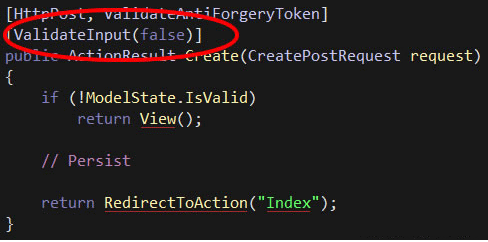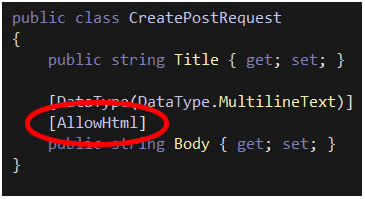I was working with ASP.NET MVC 3 validation today and was tickled to learn of the support for IValidatableObject. I mainly like to use the Enterprise Library Validation Application Block in my projects, but System.ComponentModel.DataAnnotations has come a long way in .NET Framework 4.
[Aside: Note in the following post I interchange “object“, “model“, and “self” validation.] IValidatableObject for Self Validation
For those of you who are familiar with Enterprise Library, you know it has two attributes that can be used for self validation of an object: HasSelfValidation and SelfValidation. The idea here is that there is model validation that may need to happen as a whole in addition to just property validation. Or, maybe validation is so complex that you don't want to use validation attributes and just want to do all validation “manually“ in a method. Self validation in Enterprise Library gives you opportunity to do this.
In the DataAnnotations world, you get this same kind of model or object validation by implementing IValidatableObject. ASP.NET MVC 3 has built-in support for IValidatableObject, so after propery validation it will fire off object validation if your object implements IValidatableObject. An example is shown below:

In this trivial example, I test to see if ConfirmPassword equals Password during registration using IValidatableObject. If they don't match, this is a validation error and I return a ValidationResult with the error. Pretty simple stuff.
IValidatableObject Doesn't Always Fire
There is a gotcha here that may not be obvious. IValidatableObject in ASP.NET MVC 3 will not fire if there are property-level errors. As I mentioned, ASP.NET MVC 3 property validation occurs before object validation. If there are property errors, ASP.NET MVC 3 by design will not fire IValidatableObject so as not to return false positives ( thanks to Brad Wilson of Microsoft for confirming this today ). For those of you who use EnterpriseLibrary and Self Validation where Enterprise Library combines the results, this might not seem obvious and could trip you up. ASP.NET MVC 3 does not combine the results.
In the case above, if the username is not provided ( yet as shown is required ), but both password and confirm password are provided, IValidatableObject will not fire and confirm the passwords match. IValidatableObject will not fire until all property-level validators validate, regardless if the properties play a part in the self-validation or not.
Personally I don't find this an issue, but just wasn't expecting it with all my years of Enterprise Library Validation Application Block experience.
A Note About ValidationAttribute in .NET Framework 4
Just a quick note about ValidationAttribute in System.ComponentModel.DataAnnotations. The ValidationAttribute in .NET 4 has been beefed up with a ValidationContext Class being passed in the validate method. ValidationContext contains the entire object being validated during property validation. You could create a custom validation attribute and place it on Password or ConfirmPassword for property comparison. That is certainly a workaround if you want to return the password comparison error regardless if other non-involved properties do not validate.
